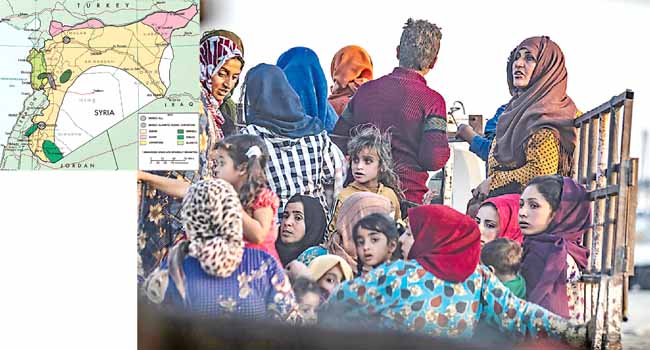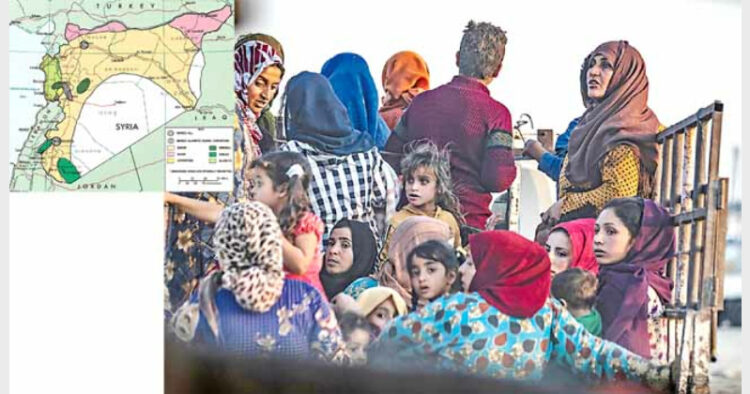
(Ethno-religious composition of Kurds) Kurds fleeing the ISIS from North Eastern Syria
Repressed for ages by its Muslim neighbours, a Kurdistan activist exhorts moral and political support from Bharat to establish an independent Kurdistan, while Turkey and Pakistan play the Kashmiri cards
NJ Thakuria
Guwahati: ‘The Kurds have no friends but the mountains’, says a proverb. And it can be understood by going through their struggles for an independent Kurdish homeland where four Muslim countries continue their repressive actions against the Kurdish people. Though being a Muslim majority nation, the Kurds have been systematically repressed by the Turkish regime in Ankara.
However, recently Turkish President Recep Tayyip Erdogan raised the issue of Jammu and Kashmir during 74th session of UNGA in New York. The argument was to safeguard the interest of Kashmiri Muslims in Jammu & Kashmir. Pakistan, which has been occupying large parts of J&K, was quick to endorse Erdogan’s action.
Lately, voices of opposition are slowly growing against the governments in Ankara and Islamabad as both the Islamic regimes continue using the religious card for their selfish interests. However, both the governments have never shown any dignified approach to the Kurds and the Balochis, who are also fighting for a sovereign Balochistan from Pakistan.
Meet an intelligent Kurdish activist, Diary Khalid Marif, who had recently interacted with a group of journalists at Guwahati Press Club through video-conferencing from Vancouver from where he thanked India for denouncing Ankara’s military offensive in the Kurdish-inhabited localities of neighbouring Syria. He also appreciated New Delhi’s advisory to its citizens travelling to Turkey.
Describing India as a follower of various religions, linguistic communities, tribes etc., Marif categorically stated that New Delhi should come forward to supporting the cause of freedom struggle of Kurdish people as they too cherish various religious faiths including Islam (both Shia and Sunni sects), Christianity, Judaism, Yazdanism, Yazidi, Bahaism, Zoroastrianism, etc with different racial groups. “India can be a natural ally to the Kurdish nation, as Hindustan is a concept of nationalism (not necessarily an entity of Sanatan Dharma) and the Kurdish people also prefer to categorize everyone on the basis of a nation and not necessarily on their religion.
Kurds have never prioritised religious issues and they are still fighting for their ethnicity,” commented Marif. Kurds are the world’s largest ethnic group with over 40 million people but without a State and they are living mostly in four countries namely Turkey, Iran, Iraq, and Syria. Unlike the common belief that every Muslim supports the Islamic State, they are different. Rather Kurdish people have successfully resisted Islamist terrorists at various junctures. “Every progressive and peace-loving nation, which expresses concern over the religious terrorism, should come forward to supporting the Kurds,” asserted Marif, pointing out that unlike ISIS, the Kurdish people maintain mutual respects to the minorities and also the women.
The young political analyst revealed that the Kurdish movement has been enriched with the active participation of their women even in the armed struggles. A regular contributor of articles to The Pasewan, Awene Weekly, Daily Hawlati, Lvin, KNN TV etc, Marif reveals that there are over 20 million Kurds in Turkey and even it is around 20 percent of its population, they are denied their ethnic identity. Torturing, imprisonment and killings of Kurds are regular happenings where they cannot openly speak the Kurdish language. Similarly, Iranian Kurdistan supports nearly 12 million Kurds (around 17 percent population of Iran) who always suffer discrimination from the Islamic Republic of Tehran. Arbitrary evictions of Kurdish families, restricted access to housing, education, and health are primary issues for Kurds in Iran.
In fact, an independent State for Kurdish people (Republic of Mahabad) existed inside Iran for some time in 1946, but soon Tehran crushed it. Iraqi Kurdistan gives shelter to around 6 million Kurds (around 17 percent of its population) where they initially enjoyed no rights. By Sixties only, rights for Kurds were included in the Iraqi constitution. Millions of Kurdish people were killed by various regimes in Baghdad, where Iraqi dictator Saddam Hussain ordered the massacre of the Kurds.
In Syrian Kurdistan, there are over 3 million Kurds (around 10 percent of Syrian population) who also face difficulties in various political spheres. However, Kurdish nationals there enjoy the right to citizenship, study in mother tongue and speak their language, added the young political analyst. Humiliated by the successive governments of Turkey, Iran, Iraq, and Syria etc for decades, the Kurdish people have to fight for their ethnic identity. Kurdish names and costumes are banned in most of these countries, where their language has also been restricted.
Despite facing all challenges, Kurds are contiuning their struggle for a sovereign Kurdistan and thousands have already sacrificed their lives for the cause. A Pune University scholar, Marif termed India as a favourite destination of Kurdish students for higher studies. He also admitted that in India he learned many things like democratic values, tolerance, dignity to minority communities and finally the unity in diversity. Marif still misses typical Indian foods, people with warm hearts and lush greenery of the country.














Comments